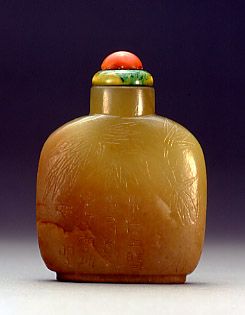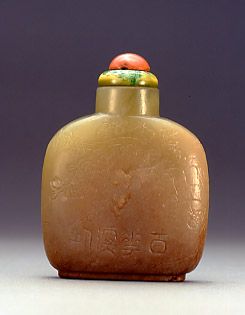

Bottle ID: 624
SQUARE FORM WITH INSCRIBED LANDSCAPE
Date: 1750-1820
Height: 60 mm
Nephrite, of flattened square form, very well hollowed, of yellow and pale brown tones, incised on one side with leafy bamboo surrounding a fourteen character archaic inscription reading:
Not yet emerged from the earth it already has joints,
And even reaching a place in the clouds, its heart is still void.
The reverse incised with a blossoming prunus tree above a four character archaic inscription.
Similar Examples:
None found.
Provenance:
Asian Art Studio
The inscription is a variant of a Tang dynasty couplet inscribed on paintings of bamboo by the famous mid-Qing poet, painter of bamboo and calligrapher Zheng Xie (1693-1765), who was better known by his studio name Banqiao. Zheng was fascinated by bamboo his whole life and often wrote about and painted them. Zheng is also known to have inscribed the same couplet on bamboo paintings by other artists. On this snuff bottle the second line of the couplet has been slightly altered, although it essentially has the same meaning. The original second line of Zheng's couplet read: And having reached the clouds, its heart is still void. Other variants for the second line also exist on bamboo paintings inscribed by earlier calligraphers, but the wording never strays from the original meaning. For example Gao Shiqi (1645-1704) records an inscription added to a bamboo painting by Wu Zhen, a famous Yuan dynasty painter, where the second line reads as follows: And even when it goes to reach the clouds, no heart exists in it. This couplet is followed by: One simply has to say that Tang poets could really compose poetry!
Bamboo is a metaphor for a gentleman, while the word 'joints' can also mean 'moral integrity. A 'void heart' is one which is free of prejudice, selfishness and ego. 'Reach the clouds' os a phrase relating to how high bamboo can grow, but it can also mean the heights of success a gentleman scholar can reach. So from first to last, from humble beginnings to lofty attainments, respect and fame, the noble man preserves his moral authority and sense of purity.
< Back to full list
 English
English 中文
中文